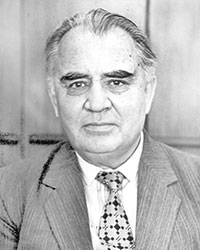SHARE WITH FRIENDS:
 Pirimkul Kadyrov (1928.25.10. Kengkul village of Shahristan district of the Republic of Tajikistan - 2010) - writer, literary scholar. People's Writer of Uzbekistan (1988). Honored Worker of Culture of Uzbekistan (1978).
Pirimkul Kadyrov (1928.25.10. Kengkul village of Shahristan district of the Republic of Tajikistan - 2010) - writer, literary scholar. People's Writer of Uzbekistan (1988). Honored Worker of Culture of Uzbekistan (1978).
He graduated from the Faculty of Oriental Studies of the University of Central Asia (1951). Adviser on Uzbek literature in the Writers' Union of the USSR (1954-63), senior researcher at the Institute of Language and Literature of the Academy of Sciences of Uzbekistan (1963-83), Chairman of the State Prize Committee for Literature, Art and Architecture of the Republic of Uzbekistan (1989-94), Supreme Soviet of Uzbekistan (Chairman of the Committee on Culture and Cultural Heritage; 1991-95), Deputy of the Oliy Majlis of the Republic of Uzbekistan (Deputy Chairman of the Committee on Science, Education, Culture and Sports; 1997-2000).
His first story was Students (1951). After that, Pirimkul Kadyrov wrote the short stories "Three Roots" (1958, novel) about the life of young people, "Qadrim" (1961) and "Erk" (1968), which reflected the lives of heroes who lost their inner freedom in the dictatorial regime and suffered from mutism. In these and other works on modern topics, Pirimkul Kadyrov effectively used the facts of his difficult life during World War II, as well as his impressions and observations of this period. In the novels "Black Eyes" (2) and "Diamond Belt" (1966), devoted to modern topics, Pirimkul Kadyrov, along with spiritual and moral issues, drew public attention to serious problems in reality, especially in rural life.
Despite the Soviet ideology's strong opposition to the coverage of historical issues in the 70s, Pirimqul Kadyrov continued the traditions of Abdulla Qodiri, Oybek, Shaykhzoda, Mirkarim Osim and wrote the novel Starry Nights (1979). In this work, the author addresses one of the most important pages in the history of the Uzbek people - the great poet and statesman Zahiriddin Muhammad Babur, and historically embodies his complex and difficult life. He later published a sequel to this work, The Passage of Generations (1989).
In his novels "Starry Nights" ("Bobur") and "Passage of Generations" Pirimkul Kadyrov vividly described the formation and development of the Baburi kingdom by observing the life of Babur, Humayun and Akbar. He acknowledged, rather than his own fantasy, that he described events in the distant past and in another country, and that both works, which were based more on "historical fantasy," that is, on real events, were sharply criticized by the Soviet ideology. , the author was accused of idealizing the past.
The suffering of the Uzbek people during the cotton monopoly was first expressed in Uzbek literature in the story "Heritage" (1974). During this period, Pirimkul Kadyrov was active in the genre of short stories, "Adventures of Akram" (1974), "Yayra wants to enter the institute" (1979), as well as "Salvation" ("Bakhils and heroes", 1980, devoted to spiritual and moral issues). ) also published his stories. The novel The Cry of the Mother Falcon (2000) provides a comprehensive account of the socio-cultural and spiritual life of Movarounnahr in the 15th century. In recent years, the author has published a book "Eyes of the Heart (badia, thoughts, memories)" (2001) and is working on new badia (essays) in this area.
As a literary scholar, Pirimkul Kadyrov dealt with scientific and theoretical issues of the Uzbek language and literature, published pamphlets "Language and language" (1972), "Folk language and realistic prose" (1973), "Language and people" (2005) and 2 volumes "Literature He wrote the chapters "The Language of a Literary Work" and "The Literary Process".
Based on Pirimkul Kadyrov's short story "Qadrim", a feature film "Your traces" (directed by R. Botirov), a novel "Starry Nights" and a series of videos based on the story "Sweet Life" (directed by M. Yusupov) were made. His play "Bobur" (directed by B. Yuldashev) has been staged for many years at the modern Uzbek National Academic Drama Theater, and his play "Insof" on the stage of regional theaters. His works have been published in Russian, Ukrainian, Hindi, Urdu, Turkish, Uyghur, Kazakh, Kyrgyz and Turkmen.
He was awarded the Hamza State Prize of Uzbekistan (1981), the Medal of Fame (1994) and the Order of Honor of the Nation (1998).
Naim Karimov.